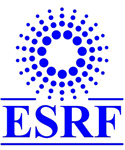The European Synchrotron, the ESRF, is an international research centre based in Grenoble, France.
Through its innovative engineering, pioneering scientific vision and a strong commitment from its 700 staff members, the ESRF is recognised as one of the top research facilities worldwide. Its particle accelerator produces intense X-ray beams that are used by thousands of scientists each year for experiments in diverse fields such as biology, medicine, environmental sciences, cultural heritage, materials science, and physics.
Supported by 22 countries, the ESRF is an equal opportunity employer and encourages diversity.
Ni superalloys are known for their high resistance to extreme conditions and frequently deployed in critical applications like aircraft turbines or nuclear fuel assemblies. Nevertheless, this material can suffer from stress corrosion damage.
You will join our team working at the materials science beamline (ID11) at the ESRF in order to quantitatively analyse the evolution of stress corrosion damage in the bulk of Ni superalloy by means of tomographic X-ray diffraction and imaging techniques. The propagation, mutual interaction and coalescence of corrosion cracks and resulting strain fields will be analyzed by phase-contrast tomography and digital volume correlation techniques, respectively. These crack observations will be complemented by (i) 3D mapping of the grain microstructure by means of X-ray diffraction contrast tomography and (ii) scanning micro-diffraction measurements of the elastic strain (and hence stress-) state of the material.
You will be trained in the analysis and interpretation of multi-dimensional datasets and your analysis will provide crucial input for concomitant numerical simulations of this damage process, carried out by our project partners (EC Nantes, Framatome).
Further information may be obtained from Wolfgang LUDWIG (tel.: +33 (0)4 76 88 29 73, email: [Email Address Removed]) and from Didier BARDEL
(+33 (0)4 72 74 87 13, email: [Email Address Removed]
- Degree allowing enrolment for a PhD (such as MSc, Master 2 de Recherche, Laurea or equivalent) in physics, materials science, chemistry or closely related science
- A background in image processing and programming skills in Python or Matlab would be advantageous
- Proficiency in English (A proof of upper-intermediate level would be advantageous and can be provided in the application. Applicants originating from native-English-speaking countries can apply without the need for proof of level. An official degree conducted in English will be also accepted as a proof; Students without proof upper-intermediate level may still apply and their level of English will be checked during the interview).
- Compliance with the Marie Sklodowska-Curie mobility rule: candidates may not have resided or carried out their main activity (work, studies, etc.) in France for more than twelve months in the three years immediately before the date of recruitment.
- At the date of recruitment, early-stage researchers must be in the first four years of their research careers and have not yet been awarded a doctoral degree.
- Candidates must satisfy eligibility criteria according to the partner university requirements for PhD enrolment.
More details about the application procedure on www.innovaxn.eu/for-students/documents/
The successful candidate will be enrolled in the doctoral school of INSA Lyon and based full-time at the ESRF (Grenoble, France), other than two 1-month secondments at FRAMATOME (mainly Lyon and some displacement to technical center le Creusot, France). Two additional visits totaling no more than 6 months will be made to our academic partner institute at Ecole Centrale, Nantes. Furthermore, a varied pedagogical training program will be offered to the successful candidate throughout the 3-year PhD project.
More details on the InnovaXN programme on www.innovaxn.eu

 Continue with Facebook
Continue with Facebook

